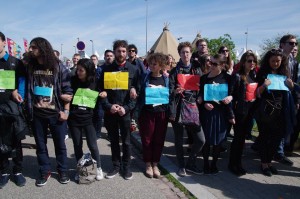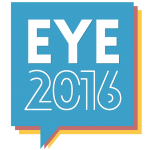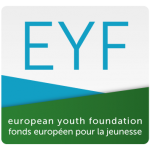30 Roma, non-Roma and Jewish young people, from all over Europe came together in Strasbourg, between 17-22 May 2016 for the seminar “Raise your voice for Roma”. The seminar, organized by Phiren Amenca and European Union of Jewish Students (EUJS), was principally about Antigypsyism and Antisemitism.
During the seminar, participants had the chance to discover what brings them together as Roma and Jewish and explored how to tackle these issues in a joint youth alliance through creative on- and offline actions, for example targeting 7000 young people at the European Youth Event 2016, which they also took part in.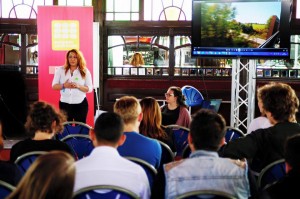
On the first day, after the participants got to know each other and shared their expectations, they also had a chance to get to know the work and the funding opportunities of the European Youth Foundation of the Council of Europe. Besides the introductions of the different actors, Antigypsiysm and Antisemitism were the key topics of discussion, and were combined on the second day with a specific activity called, “what brings us together”. In this activity, two important timelines were presented: the Roma history timeline and the Jewish History timeline where the participants could see the similarities between the history that Roma and Jewish people share.
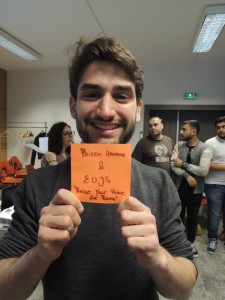 Another presentation took place on the same day about Jewish stereotypes in social media and about a Roma group called “Gabor” that has traditional apparel similar to traditional Jewish apparel. A second activity for the day was about superheroes and stories of resistance: X-Men vs Magneto. In this activity, the participants essentially had to choose one of the two “sides”, which represented two possible ways of social movements. Another activity was to create a social campaign by splitting into groups and making a video, which involved local people as well.
Another presentation took place on the same day about Jewish stereotypes in social media and about a Roma group called “Gabor” that has traditional apparel similar to traditional Jewish apparel. A second activity for the day was about superheroes and stories of resistance: X-Men vs Magneto. In this activity, the participants essentially had to choose one of the two “sides”, which represented two possible ways of social movements. Another activity was to create a social campaign by splitting into groups and making a video, which involved local people as well.
In the second part of the seminar, participants took part in the European Youth Event (EYE) in the European Parliament, together with 7000 other young people. Phiren Amenca’s group aim during the event was to spread the voice of the Roma youth through different activities: a flash mob was organised representing the vision of a “Wall Free Europe”, which was followed by personal discussions and personal stories between the participants and the audience; later on they also invited visitors to destroy these walls symbolically themselves, so that there wouldn’t be walls anymore in Europe.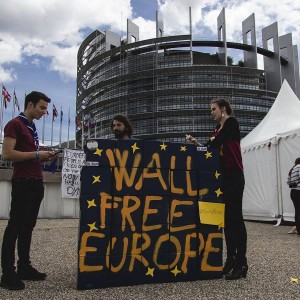
Phiren Amenca had a “Roma quiz” in the Youth Village, where visitors could learn more about Roma people, history and, for example, about artists they didn`t even know were Roma. On the first evening of the EYE, Phiren Amenca organized a film screening, where they showed the movie called Rromano Drom (by Krystina Balaban) about the situation of Roma nowadays. After the movie, during an open discussion, it was visible that the audience understood the main goal of the movie, that Roma are not as different as they thought and were given a look into the current situation of Roma in Europe.
On the second day of the event, a panel discussion called ”So keres Europa?! – What`s happening Europe” took place, where all the seats were taken and visitors showed their real interest in participating in anti-discrimination in Europe. The main topics of the discussion were: participation and exclusion of young Roma people; what is Antigypsyism and how does it affect the lives of young people; and how can we increase the participation of young Roma and make their existing contribution more visible.
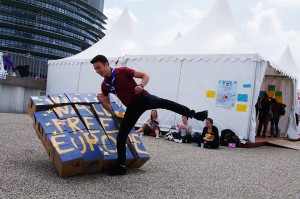 Speakers of this panel were: Astrid Oelpenich – Phiren Amenca; Robert Rustem – Secretariat ERTF, Council of Europe; Atanas Stoyanov – Ergo Network; Orsolya Szabó – Phiren Amenca; and Vincente Rodriguez – Phiren Amenca.
Speakers of this panel were: Astrid Oelpenich – Phiren Amenca; Robert Rustem – Secretariat ERTF, Council of Europe; Atanas Stoyanov – Ergo Network; Orsolya Szabó – Phiren Amenca; and Vincente Rodriguez – Phiren Amenca.
For more information about “So keres Europa” please visit http://www.sokeres.eu/
For information on “Citizens’ tools for Roma Participation” please visit www.phirenamenca.eu
Phiren Amenca was also involved in another panel discussion called “Discrimination divides, diversity connects”, which used examples and testimonies to illustrate how young people and youth organisations are affected by multiple discrimination and how they respond to it.
In addition, EUJS and Phiren Amenca held a workshop in the European Parliament on “Minority report: A network of solidarity”. It was organised by Roma, Armenian, Jewish and minority youth activists and youth organisations that started to build a network of solidarity in the past year through a project called “A Europe of Diasporas”. The workshop raised a debate about the position, challenges, interests and potential of minorities in Europe to strengthen peace, solidarity and equality.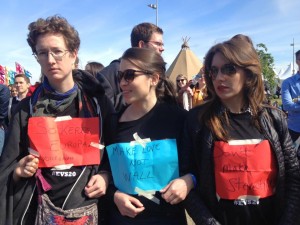
Representatives of this panel introduced the project – which was run by EUJS, Phiren Amenca and AGBU – and discussed its outcomes. The speakers were: Vincente Rodriguez – Phiren Amenca; Stoyanov Atanas – Ergo Network; and Elliot Zelmanovits – European Union of Jewish Students. Then, in different working groups they invited the audience to discuss four themes, which were also the basic topics of the project: education, culture, prejudice and remembrance.
For more information about the “Europe of Diasporas” project please visit: http://europeofdiasporas.eu/project
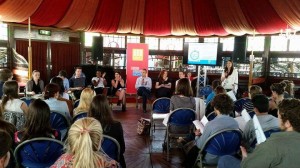 The last day of the European Youth Event ended with an amazing concert offered by the European Parliament where 7000 young people could enjoy the night together. On the last day of the Phiren Amenca seminar, participants evaluated their work at the European Youth Event in order to be more effective and visible in the EYE 2017. They also created campaign tools to spread the voice of Roma in their own countries.
The last day of the European Youth Event ended with an amazing concert offered by the European Parliament where 7000 young people could enjoy the night together. On the last day of the Phiren Amenca seminar, participants evaluated their work at the European Youth Event in order to be more effective and visible in the EYE 2017. They also created campaign tools to spread the voice of Roma in their own countries.
As Angela, current Phiren Amenca volunteer, said: “this memorable experience increased our knowledge, made us combine the practical things we did to raise our voice for Roma. The seminar gave us an insight into the current situation of Roma and gained skills to react to discrimination with practical tools. Also, we are richer culturally. I am happy Phiren Amenca organized this seminar; it is a unique opportunity to make our voices heard”.
This seminar has been supported by the European Youth Foundation of the Council of Europe and the European Parliament.


